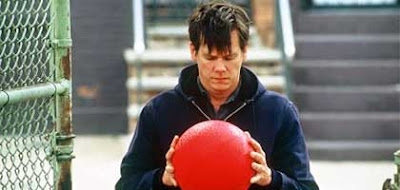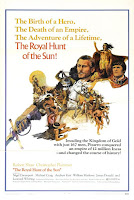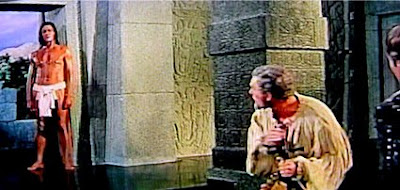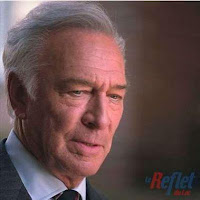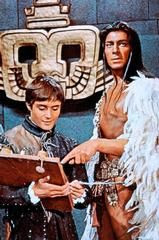 WARNING: Spoilers...as with most of my reviews. Not as many links though.
WARNING: Spoilers...as with most of my reviews. Not as many links though.Faerie Tales have been softened over the centuries. Our modern day Little Mermaid lives happily ever after never learning her lesson of true love through self sacrifice. Our story heroes and villains have become toys and animals to remove the human elements from the violence and suffering. We have forgotten that these stories were meant to teach, to moralize and preach to our children. Now they sell. Fantasies of princesses and stories of race cars sell dresses and toys, bed sheets and pajamas. What are we supposed to learn from the fish? What does the robot teach us? Ask the kids, do they know? Faerie tales are now synonymous with fantasy. Sleeping Beauty is hack-edited to warn against forest fires. Snow White has too much sex and violence....not enough singing birds.
Some stories can still offer us a lesson. Morality is not just for plain-clothed Anabaptists or Muslims. The power to change, to learn, to grow exists in all of us....even the monsters can still turn out to be cursed princes. What about stories told from the villain's point of view? Stories are usually told by the victims who become heroes. What can we learn from a story told by a villain? Perhaps the story of a villain already defeated, broken and weak. The stories always end there, with defeat. What happens next? What does the villain become once defeated? Do they change, learn their lesson, or move on to commit their wickedness again elsewhere? A villain's story begins with defeat.
When the wolf had appeased his appetite, he lay down again in the bed, fell asleep and began to snore very loud. The huntsman was just passing the house, and thought to himself, "How the old woman is snoring! I must just see if she wants anything." So he went into the room, and when he came to the bed, he saw that the wolf was lying in it. "Do I find thee here, thou old sinner!" said he. "I have long sought thee!"
~The Brothers Grimm, Little Red Cap
 The Woodsman begins with defeat. The Villain is the Hero. And Steven Fechter wants you to feel empathy for him. You won't find many of Steven Fechter's stories on IMDb or Netflix. He mostly writes plays. Director Nicole Kassell's resume isn't very long or impressive either. She had only recently graduated from film school in 2005. Yet a collection of actors of esteem and reputation gathered for them and worked for no pay. Either Steven and Nicole are the coolest cats in Hollywood...or that's one hell of a story. As I can't speak to the first theory, we'll examine the second.
The Woodsman begins with defeat. The Villain is the Hero. And Steven Fechter wants you to feel empathy for him. You won't find many of Steven Fechter's stories on IMDb or Netflix. He mostly writes plays. Director Nicole Kassell's resume isn't very long or impressive either. She had only recently graduated from film school in 2005. Yet a collection of actors of esteem and reputation gathered for them and worked for no pay. Either Steven and Nicole are the coolest cats in Hollywood...or that's one hell of a story. As I can't speak to the first theory, we'll examine the second. Most any film with Kevin Bacon is one that I'll gladly watch. I don't necessarily rave about them or even wholly enjoy all of them, but almost without fail I am given something to think about by the end. He doesn't always do the big budget movies, like the newly released biopic Frost/Nixon (2008), or 2003's Mystic River. He doesn't shy from having fun in films like Novocaine (2000) and Footloose (1984). I feel, however, Kevin Bacon is at his best when playing pained characters, villains, people on the fringes of society that we don't necessarily even want to like, such as Hickey in Trapped (2002) or Sean Nokes in Sleepers (1996).
Most any film with Kevin Bacon is one that I'll gladly watch. I don't necessarily rave about them or even wholly enjoy all of them, but almost without fail I am given something to think about by the end. He doesn't always do the big budget movies, like the newly released biopic Frost/Nixon (2008), or 2003's Mystic River. He doesn't shy from having fun in films like Novocaine (2000) and Footloose (1984). I feel, however, Kevin Bacon is at his best when playing pained characters, villains, people on the fringes of society that we don't necessarily even want to like, such as Hickey in Trapped (2002) or Sean Nokes in Sleepers (1996). This Independently recognized but largely unnoticed film, The Woodsman, is by far one of Kevin Bacon's finest performances. A powerful cast backs him up as he is partnered with Kyra Sedgewick, his real life wife, and the likes of Benjamin Bratt, Mos Def, Eve, David Alan Grier, and Bug's Michael Shannon. Filmed in my hometown of Philadelphia, The Woodsman follows Walter as he readjusts to life while on parole after a twelve year jail term. It isn't made clear right away that Walter went to prison for molesting young girls, as any dark, dirty secret takes time to draw out. And this is our story's hero....or anti-hero. Walter is our villain, whose story begins after his defeat.
This Independently recognized but largely unnoticed film, The Woodsman, is by far one of Kevin Bacon's finest performances. A powerful cast backs him up as he is partnered with Kyra Sedgewick, his real life wife, and the likes of Benjamin Bratt, Mos Def, Eve, David Alan Grier, and Bug's Michael Shannon. Filmed in my hometown of Philadelphia, The Woodsman follows Walter as he readjusts to life while on parole after a twelve year jail term. It isn't made clear right away that Walter went to prison for molesting young girls, as any dark, dirty secret takes time to draw out. And this is our story's hero....or anti-hero. Walter is our villain, whose story begins after his defeat.WALTER
You can’t talk to me like --
SGT LUCAS
(interrupting)
Like a piece of shit? In my eyes,you are a piece of shit. Think anyone would miss you if I threw you out the window right now? I could say you jumped when I came
in. Who are they going to believe? Not you, because you’d be a dead piece of shit.
 It is no joke that this film actively seeks to erase the cartoon archetypes in which many view the world, and it drags us along kicking and screaming. The story sets Walter (Kevin Bacon) up as a sad, broken man and immediately seeks sympathy for him before you know what he's done. The viewer begins to feel for him, wants to know his story and then the truth of his past is revealed. The hero of our story is a convicted child molester. By most people's definition, a monster. A wolf. Using the story of Little Red Riding Hood (the Grimm version) to illustrate the world, Sgt. Lucas, played with depth and weight by Mos Def, explains to Walter that there are no Woodsman anymore, only wolves. Even he, as a lawman feels helpless against them, and because of his helplessness he refuses to like Walter, refuses to see him as anything but a monster. But Walter isn't a monster, just a man. He is just a man who feels just as helpless and repulsed by what he is and what he has done, though part of him still tries to reason it out.
It is no joke that this film actively seeks to erase the cartoon archetypes in which many view the world, and it drags us along kicking and screaming. The story sets Walter (Kevin Bacon) up as a sad, broken man and immediately seeks sympathy for him before you know what he's done. The viewer begins to feel for him, wants to know his story and then the truth of his past is revealed. The hero of our story is a convicted child molester. By most people's definition, a monster. A wolf. Using the story of Little Red Riding Hood (the Grimm version) to illustrate the world, Sgt. Lucas, played with depth and weight by Mos Def, explains to Walter that there are no Woodsman anymore, only wolves. Even he, as a lawman feels helpless against them, and because of his helplessness he refuses to like Walter, refuses to see him as anything but a monster. But Walter isn't a monster, just a man. He is just a man who feels just as helpless and repulsed by what he is and what he has done, though part of him still tries to reason it out."They seduced me. At least, that's what I used to tell myself." -Walter
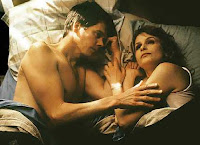 On parole, Walter is trying to start a new life, to be a better person and not make the same mistakes. He finds a job at the wood mill he will work under the supervision of Bob, played by David Alan Grier. It's plain on Bob's face that he disapproves of Walter's past, but he is willing to give him a chance, for reasons never explained beyond "you did good work for my father." Even when Bob defends Walter from a near riotous mob of co-workers by threatening their jobs, little more is revealed. The symbolism of the sawmill is quite obvious and in someways foretelling. It is here that he meets Vicki. Portrayed with a grim strength by Bacon's off-screen wife, Kyra Sedgwick, Vicki is a woman that can hold her own, doesn't need protecting and isn't afraid of Walter's past, though he keeps it from her for some time. Once he confesses it, upon her urging, she is more curious than repulsed and it is her lack of repulsion that frightens Walter. He sends her away. Walter still views the world in stark lines of good and evil. He is a monster undeserving of acceptance, pity or love. Repeatedly he pleads of his therapist:
On parole, Walter is trying to start a new life, to be a better person and not make the same mistakes. He finds a job at the wood mill he will work under the supervision of Bob, played by David Alan Grier. It's plain on Bob's face that he disapproves of Walter's past, but he is willing to give him a chance, for reasons never explained beyond "you did good work for my father." Even when Bob defends Walter from a near riotous mob of co-workers by threatening their jobs, little more is revealed. The symbolism of the sawmill is quite obvious and in someways foretelling. It is here that he meets Vicki. Portrayed with a grim strength by Bacon's off-screen wife, Kyra Sedgwick, Vicki is a woman that can hold her own, doesn't need protecting and isn't afraid of Walter's past, though he keeps it from her for some time. Once he confesses it, upon her urging, she is more curious than repulsed and it is her lack of repulsion that frightens Walter. He sends her away. Walter still views the world in stark lines of good and evil. He is a monster undeserving of acceptance, pity or love. Repeatedly he pleads of his therapist:WALTER
When will I be normal?
ROSEN
What is normal to you?
 Over the course of Walter's journey of self discovery, as he attempts to assimilate into society and learn to "be normal," there are several figures that reflect aspects of his past life. A brother-in-law, Carlos who behaves as if the crimes never occurred, and treats Walter as if there had never been a twelve year gap in their friendship. Benjamin Bratt does well in creating this layered character, that takes on a seemingly willing role of friendship with the hint of mild obligation because Walter was not biased toward him, though all his family was bigoted against his ethnicity. Though he displays acceptance and empathy, it is when Walter finally does open up, that the man's true feelings are revealed. During a powerful scene Carlos (Bratt) describes his own troubles with temptation, claiming to 'understand' how Walter feels. He remarks that even his twelve year old daughter and her friends where clothes now that make it difficult to avoid such temptation. HE bridges the gap of empathy, yet when Walter asks if Carlos ever feels anything for his daughter, asks if Carlos TRULY ever feels what Walter feels, that barrier between "Us and Them" is crossed and Carlos becomes outraged.
Over the course of Walter's journey of self discovery, as he attempts to assimilate into society and learn to "be normal," there are several figures that reflect aspects of his past life. A brother-in-law, Carlos who behaves as if the crimes never occurred, and treats Walter as if there had never been a twelve year gap in their friendship. Benjamin Bratt does well in creating this layered character, that takes on a seemingly willing role of friendship with the hint of mild obligation because Walter was not biased toward him, though all his family was bigoted against his ethnicity. Though he displays acceptance and empathy, it is when Walter finally does open up, that the man's true feelings are revealed. During a powerful scene Carlos (Bratt) describes his own troubles with temptation, claiming to 'understand' how Walter feels. He remarks that even his twelve year old daughter and her friends where clothes now that make it difficult to avoid such temptation. HE bridges the gap of empathy, yet when Walter asks if Carlos ever feels anything for his daughter, asks if Carlos TRULY ever feels what Walter feels, that barrier between "Us and Them" is crossed and Carlos becomes outraged.WALTER (V.O.)
(in the ratatat tone of a sportscaster)
Good morning, fellow sports fans. The match is about to begin. Candy enters the arena looking sweet and trim. He checks out the scene but plays it cool. He’s definitely holding back.
(Pause)
Uh-oh, Candy’s eyes have locked onto something. Oh yeah. A cherub of a lad has separated from his friends. Candy quickly makes his move. He pats the cherub on his head, ruffles his hair. With his other hand, he offers the boy a bag of gummy bears.
 Another reflection is "Candy," a man that Walter spies lingering at the school yard across from his apartment. Walter has given him this name and watches, writing in his journal as he sees the "game" play out. It is disturbing to follow Walter's thought process as he rationalizes at one point that if the child gets in Candy's car it is because the boy WANTS to get in Candy's car. Although at times Walter seems disgusted by Candy's actions and feels a need to stop him, he identifies with him too much and fears the police would not believe him, or would scape goat him. By viewing these events through a window, from the outside, he begins to see and understand the nature of "The Wolf's Hunt." Director Kassell uses a unique and clever technique at one point using voice-over narration and fast-paced editing to liken Candy's successful luring of the boy to a boxing match, to a game, which is how the old Walter and Candy view it. It does not lighten the tension of the scene but does shift the perspective entirely without the audience consciously realizing that they are viewing the events through the mindset of a predator.
Another reflection is "Candy," a man that Walter spies lingering at the school yard across from his apartment. Walter has given him this name and watches, writing in his journal as he sees the "game" play out. It is disturbing to follow Walter's thought process as he rationalizes at one point that if the child gets in Candy's car it is because the boy WANTS to get in Candy's car. Although at times Walter seems disgusted by Candy's actions and feels a need to stop him, he identifies with him too much and fears the police would not believe him, or would scape goat him. By viewing these events through a window, from the outside, he begins to see and understand the nature of "The Wolf's Hunt." Director Kassell uses a unique and clever technique at one point using voice-over narration and fast-paced editing to liken Candy's successful luring of the boy to a boxing match, to a game, which is how the old Walter and Candy view it. It does not lighten the tension of the scene but does shift the perspective entirely without the audience consciously realizing that they are viewing the events through the mindset of a predator. Candy's abduction of the boy is a serious turning point for Walter and pushes him faster toward understanding the predator that he was. Walter faces numerous challenges throughout the story all forcing him to face his past and provide temptation to repeat or deny the same urges. The biggest catalyst in his journey toward recovery and moral salvation is Robin, an eleven year old girl that rides Walter's evening bus. For those who quickly draw the connection between the character and Sgt Lucas' anecdotal tale, it is noted that Robin carries a red coat throughout the film--but only wears it at one poignant point. Hannah Pilkes does an admirable job as Robin, allowing us to easily believe her role as she metaphorically guides Walter through the woods, innocently serving herself before Walter as a meal of moral dilemma. With Bacon's pained, at times childlike, portrayal of Walter and Fechter's masterful development of the character, the audience cannot help but reach a point where they are routing for Walter to make the right choice. He is presented with this red-cloaked beacon of morality amidst the woods and Walter can chose to be the Wolf that he once was or he can be The Woodsman.
Candy's abduction of the boy is a serious turning point for Walter and pushes him faster toward understanding the predator that he was. Walter faces numerous challenges throughout the story all forcing him to face his past and provide temptation to repeat or deny the same urges. The biggest catalyst in his journey toward recovery and moral salvation is Robin, an eleven year old girl that rides Walter's evening bus. For those who quickly draw the connection between the character and Sgt Lucas' anecdotal tale, it is noted that Robin carries a red coat throughout the film--but only wears it at one poignant point. Hannah Pilkes does an admirable job as Robin, allowing us to easily believe her role as she metaphorically guides Walter through the woods, innocently serving herself before Walter as a meal of moral dilemma. With Bacon's pained, at times childlike, portrayal of Walter and Fechter's masterful development of the character, the audience cannot help but reach a point where they are routing for Walter to make the right choice. He is presented with this red-cloaked beacon of morality amidst the woods and Walter can chose to be the Wolf that he once was or he can be The Woodsman. To be The Woodsman would imply that he rescues the little girl in some manner-as is the case in the original Grimm tale- and in Fechter's stage play this is true. Unfortunately to see Walter's whole transformation as he shifts from predator--and he does enter this scene a predator--through the agony of self realization into the figure that saves the child, you must view the deleted scenes on the DVD. I can only imagine that the exclusion of these scenes was done for pacing's sake--a frequent killer of powerful cinematic moments--I feel that there are significant character development lost in these hacked scenes. The film over all is a character piece, therefore, these pieces are missed when removed although the audience may not realize and I feel that our perception of Walter is weaker for it.
To be The Woodsman would imply that he rescues the little girl in some manner-as is the case in the original Grimm tale- and in Fechter's stage play this is true. Unfortunately to see Walter's whole transformation as he shifts from predator--and he does enter this scene a predator--through the agony of self realization into the figure that saves the child, you must view the deleted scenes on the DVD. I can only imagine that the exclusion of these scenes was done for pacing's sake--a frequent killer of powerful cinematic moments--I feel that there are significant character development lost in these hacked scenes. The film over all is a character piece, therefore, these pieces are missed when removed although the audience may not realize and I feel that our perception of Walter is weaker for it."Uncommon beauty is commonly overlooked." -Walter
 Many people are turned off by a slow paced film, which I do not feel The Woodsman truly is if you take the time to look beneath the surface--an important lesson being taught by this story. Far too rarely recognized upon the screen, Michael Shannon takes on the role of the moral guide, Walter's therapist Rosen. The interludes in Rosen's office serve as a vocal introspection for Walter to the audience. Rosen guides us as much as he guides Walter, managing to steer the audience away from making those stern categorical opinions of the preceding events. Rosen allows for the moral center of the film to grow from a seed, up and outward, repeatedly reminding that it takes time.
Many people are turned off by a slow paced film, which I do not feel The Woodsman truly is if you take the time to look beneath the surface--an important lesson being taught by this story. Far too rarely recognized upon the screen, Michael Shannon takes on the role of the moral guide, Walter's therapist Rosen. The interludes in Rosen's office serve as a vocal introspection for Walter to the audience. Rosen guides us as much as he guides Walter, managing to steer the audience away from making those stern categorical opinions of the preceding events. Rosen allows for the moral center of the film to grow from a seed, up and outward, repeatedly reminding that it takes time. WALTER
A long time ago, I was sent far away. When they let me come back, all my friends were gone.
ROBIN
It sounds like you were banished.
WALTER
Banished... yeah.
 Just as the story's moral teaches--there are shades and levels to all things--much of this film and its characters are not exploded on the screen. They are revealed subtlety, only hinted at, or a mild enigma to be worked out- just as is true with life. Walter's past crimes are often alluded to, but never dwelled on. The Woodsman is not an easy film to watch; not one to pop in when guests are over or to lighten an already tense day. It is a film that shatters the archetypes and barriers we set to isolate "Them" from "Us"; lines and divisions made to give us the illusion of safety and purity. It is easier for us to deny the darker shades of grey and see only black or white. To believe there are only Woodsman or Wolves.
Just as the story's moral teaches--there are shades and levels to all things--much of this film and its characters are not exploded on the screen. They are revealed subtlety, only hinted at, or a mild enigma to be worked out- just as is true with life. Walter's past crimes are often alluded to, but never dwelled on. The Woodsman is not an easy film to watch; not one to pop in when guests are over or to lighten an already tense day. It is a film that shatters the archetypes and barriers we set to isolate "Them" from "Us"; lines and divisions made to give us the illusion of safety and purity. It is easier for us to deny the darker shades of grey and see only black or white. To believe there are only Woodsman or Wolves."Do you believe in Fairy Tales?The world is not flat. It is not black and white. It is not good and evil. The world is a forest. Thick and dense, deeper than most of us will ever know. There are wolves, yes, but who better knows the villains' tricks? Where does a villain go after defeat? What does he become? A villain's story begins with defeat.
...What's that one with the Woodsman?
...Little Red Riding Hood! That's it! That's it. The Woodsman, he cuts open the wolf's stomach, the girl comes out without a scratch... You ever see a seven-year-old sodomized in half? She was so small, just broken. I saw 20-year vets on that job. Hard guys, they just broke down and cried. I was there, I cried... There ain't no fucking woodsman in this world." -Sgt. Lucas
